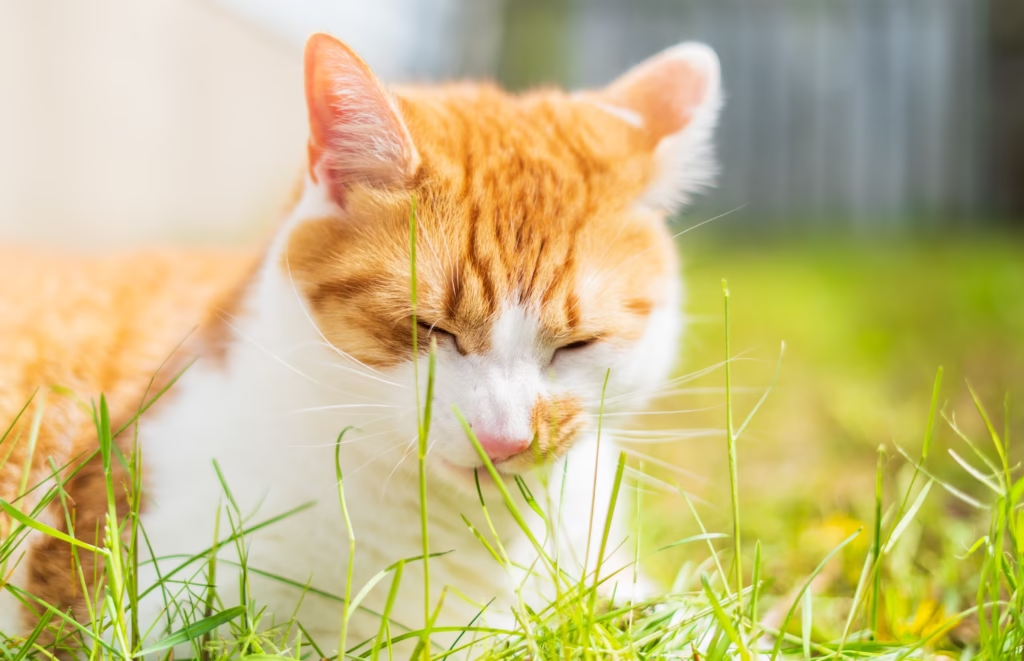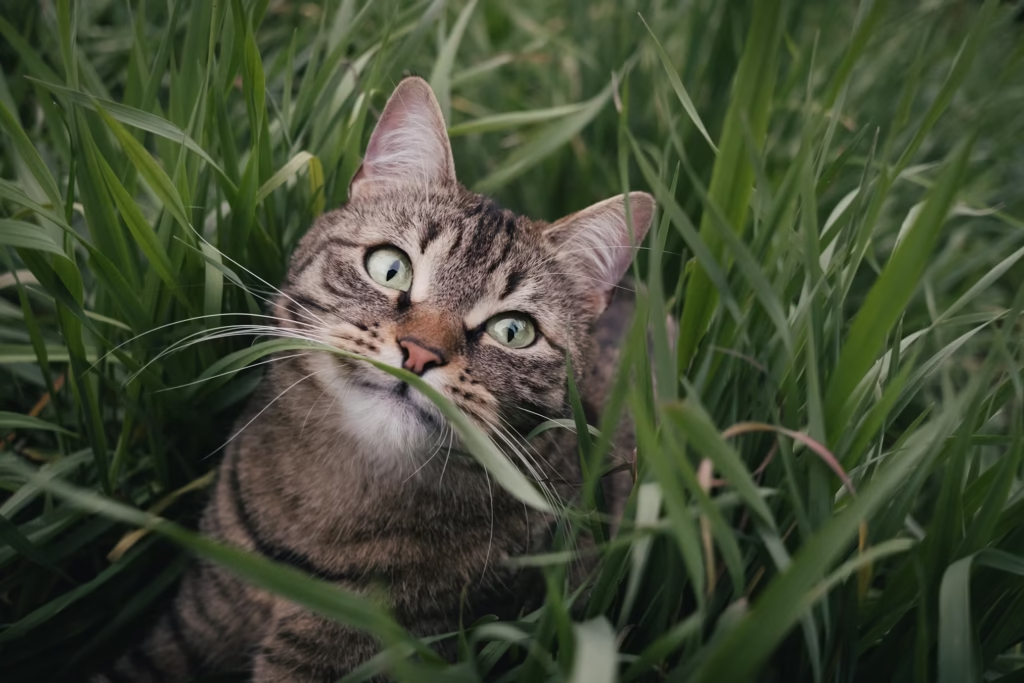Why Do Cats Eat Grass? 7 Fascinating Reasons Behind This Feline Quirk 🐱

Ever catch your cat gnawing on a blade of grass like it’s the best thing since canned tuna? 😺 You’re not alone. If you’ve found yourself Googling why do cats eat grass, welcome to the club of slightly confused but wildly curious cat parents. It’s one of those mysterious behaviors that feels almost too weird for words—carnivorous hunters suddenly grazing like tiny, furry cows?
But here’s the twist: this behavior is totally normal, and it actually makes a lot more sense than it seems.
In this meow-sterpiece of a guide, we’ll explore:
- The 7 most fascinating (and vet-approved) reasons cats eat grass
- Answers to big questions like why do cats eat grass and throw up? and is it OK for cats to eat grass?
- How to keep your little grazer safe while satisfying their leafy cravings
- And of course, when it’s time to worry and call the vet
Let’s roll in the grass—figuratively, of course—and decode this wild side of your feline friend.
Table of Contents
So… Why Do Cats Eat Grass, Really?
Let’s start with the basics: cats are obligate carnivores. That means meat is their main gig. They don’t need greens to survive, and yet here they are, chewing grass like they’re prepping for a salad bar showdown. What gives?
Turns out, cats may not eat grass for nutrition the same way we devour kale (reluctantly). Instead, grass offers a buffet of benefits—from aiding digestion to satisfying instincts that go way back to their wild ancestors. Think of it as an ancient ritual, with a touch of modern cat flair.
Let’s break down the most likely reasons your kitty is going full herbivore (at least temporarily).
1. Grass Helps With Digestion—And Sometimes Vomiting
One of the most common answers to why do cats eat grass and throw up is surprisingly simple: they do it on purpose.
Grass can tickle the lining of your cat’s stomach, causing them to vomit—especially if they’ve eaten something indigestible like a hairball or a bit of string. It’s nature’s way of hitting the reset button. 🌿💥
Dr. Sarah, DVM weighs in:
“Occasional vomiting after grass consumption is normal. It may help your cat clear out irritants. But chronic vomiting? That’s a red flag—time for a vet visit.”
So don’t panic if Fluffy throws up once in a while after a grassy snack. But if it happens daily or your cat seems uncomfortable, it’s time to investigate further.
2. It’s the Hairball Helper You Never Knew They Needed

If you’ve ever stepped on a wet, warm hairball at 2AM—congrats, you’re officially a cat parent. 🏆
Cats groom themselves obsessively, and that means lots of loose fur ends up in their digestive system. Grass acts like a mild natural laxative, either helping them pass hairballs through their poop or throw them up.
Think of it as a digestive broom. Not pretty, but highly effective.
Hack for cat parents: Try offering pet-safe wheatgrass indoors. It’s like gifting your cat a tiny green toothbrush and digestive tool in one!
3. A Natural Nutrient Boost? Yep, That Too
Here’s a fun twist: grass isn’t just roughage. It also contains trace nutrients like folic acid—a vitamin essential for red blood cell production and general health.
Some cats may instinctively munch on grass to top off their micronutrient levels, especially if their diet is missing something.
Dr. Emily, feline nutritionist, explains:
“While grass shouldn’t replace a balanced diet, some cats may nibble for a bit of folic acid or other minor benefits.”
So if your cat is consistently chowing down on grass, it might be worth reviewing their food. Are they getting a complete and balanced meal? Time to check those labels.
4. Stress, Boredom, and… Emotional Grazing?
You know how we reach for snacks when we’re bored or anxious? Cats do it too—only their snack of choice might be grass.
Indoor cats especially may turn to chewing grass as a form of stimulation or stress relief. The texture, the movement, the scent—it’s a whole experience for them.
Pet Parent Tip: Keep your cat engaged with puzzle feeders, interactive toys, and vertical spaces like cat trees. A mentally enriched cat is a happy cat—and less likely to obsess over grass.
5. It’s an Ancient Instinct (Blame Their Wild Roots) 🐾
Even the most pampered house cat shares DNA with wild hunters who consumed whole prey—fur, bones, and all. Those wild meals often included plant material from their prey’s stomachs.
Grass-eating could be an evolutionary echo—your cat’s way of mimicking behaviors that once helped their ancestors survive in the wild. It’s instinctual, like kneading blankets or hiding in boxes.
So the next time your kitty chows down on grass, just remember: they’re channeling their inner wildcat.
6. They Just Like the Taste and Texture
This might sound overly simple, but… maybe your cat just likes grass.
Yep. Some cats seem to genuinely enjoy the crunchy texture, the fresh scent, or the novelty of chewing something green. It stimulates their senses and gives them something new to explore—especially in an otherwise routine day.
It’s the feline version of trying a new snack because it “just looks fun.”
7. It Might Be a Weird Way to Mark Territory

Cats are scent-driven creatures. They mark territory by rubbing, scratching, and sometimes—chewing.
Some animal behaviorists suggest that when cats chew grass and leave behind their saliva, they’re subtly claiming the area. Think of it as your cat’s version of writing their name on their lunchbox. 😼
If you have multiple cats, you might notice some “ownership battles” over who gets to chew the grass patch. In that case, it’s best to give each kitty their own plant. Peacekeeping at its finest.
Is It OK for Cats to Eat Grass?
Here’s the million-dollar question: Is it safe for cats to eat grass?
The short answer: Yes—if it’s the right kind of grass.
Safe Grass Includes:
- Wheatgrass
- Oat grass
- Rye grass
- Barley grass
These can be grown indoors and are completely safe for feline snacking. Just make sure they’re pesticide-free and haven’t been treated with fertilizers.
When to Worry: Signs That Grass Isn’t Just Grass
Grass-eating is mostly harmless, but in some cases, it can signal an underlying problem.
Red Flags:
- Frequent vomiting after eating grass (more than once or twice a week)
- Lethargy, hiding, or loss of appetite
- Eating non-grass plants (which may be toxic)
- Exposure to treated lawns (think pesticides or herbicides)
- Compulsive grass eating with signs of distress
In These Cases, Call Your Vet:
If your cat is showing any of the above symptoms or you’re just not sure what’s going on, don’t hesitate. It’s always better to be safe than sorry—especially when Fluffy can’t explain what’s wrong.
How to Keep Your Cat’s Grass-Eating Safe and Fun 🐾

Want to embrace your cat’s grassy obsession without the worry? Here’s how:
✅ Grow Your Own Cat Grass
You can find affordable kits online or at pet stores. It takes just a few days to sprout, and your cat will love it.
✅ Avoid Toxic Plants
Lilies, pothos, aloe, and dozens of others are dangerous to cats. Make sure your indoor greenery is cat-safe.
✅ Supervise Outdoor Access
If your cat roams outside, keep an eye on where they graze. Avoid lawns that may be chemically treated.
✅ Consider Their Diet
Sometimes grass-eating stems from nutrient deficiencies. Ensure your cat food meets AAFCO standards for complete and balanced nutrition.
✅ Enrich Their Environment
A bored cat is a mischievous cat. Provide toys, scratching posts, high perches, and interactive playtime to reduce stress-related chewing.
FAQs About Cats and Grass
Why do cats eat grass and throw up?
Grass irritates the stomach lining, which can help cats expel indigestible material. Occasional vomiting is normal—but if it’s frequent, talk to your vet.
Why do cats like to eat grass?
It could be instinct, boredom, or even enjoyment of the texture and taste. Each cat is unique!
Is it OK for cats to eat grass daily?
Yes, as long as it’s pet-safe grass and your cat shows no signs of illness or distress.
Why do cats chew grass instead of swallowing it?
Chewing stimulates saliva production and may soothe the mouth or throat. It’s not always about ingestion.
Final Thoughts: Let Your Cat Be a Little Weird
So, why do cats eat grass? Because it helps them feel better, satisfies instincts, and sometimes… just because they want to.
It might look odd, but in most cases, it’s perfectly healthy behavior. Your job? Offer safe options, keep an eye out for warning signs, and embrace the quirks that make your cat, well, your cat.
If you’re ever unsure, your vet is just a call away. But until then, grow that wheatgrass, snap a few cute pics, and let your little lion graze in peace. 🌱
Did your cat surprise you with their grass obsession? Drop your story in the comments! And don’t forget to bookmark this guide for future cat-parent moments of “what the heck is my cat doing?” 😸
Sources:
- Dr. Sarah, DVM, Feline Internal Medicine
- Dr. Emily, Feline Nutritionist
- American Veterinary Medical Association (AVMA)
- ASPCA Animal Poison Control Center
